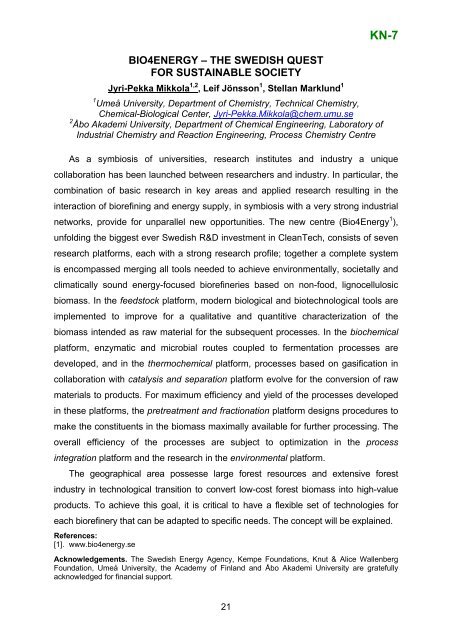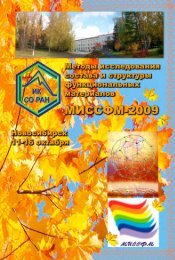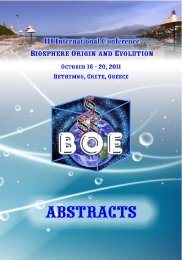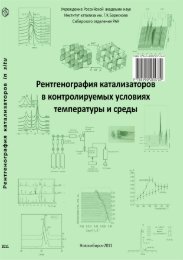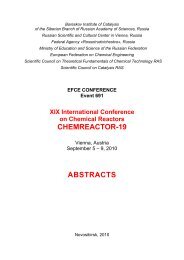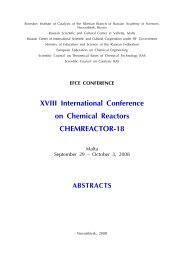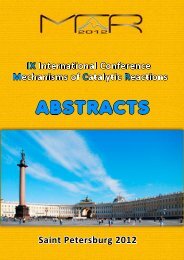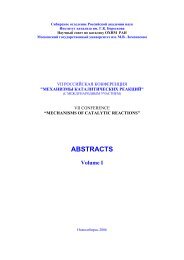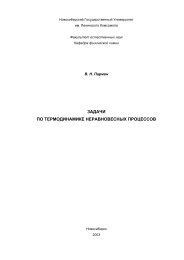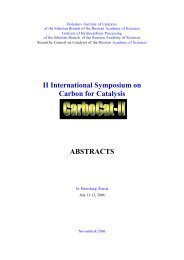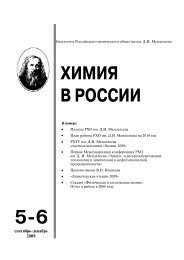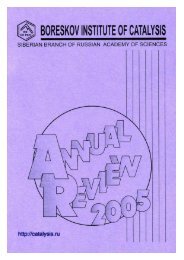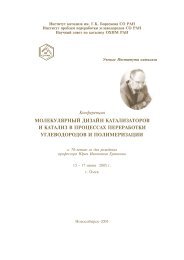Boreskov Institute of Catalysis SB RAS, Novosibirsk, Russia
Boreskov Institute of Catalysis SB RAS, Novosibirsk, Russia
Boreskov Institute of Catalysis SB RAS, Novosibirsk, Russia
- No tags were found...
Create successful ePaper yourself
Turn your PDF publications into a flip-book with our unique Google optimized e-Paper software.
BIO4ENERGY – THE SWEDISH QUESTFOR SUSTAINABLE SOCIETYJyri-Pekka Mikkola 1,2 , Leif Jönsson 1 , Stellan Marklund 1KN-71 Umeå University, Department <strong>of</strong> Chemistry, Technical Chemistry,Chemical-Biological Center, Jyri-Pekka.Mikkola@chem.umu.se2 Åbo Akademi University, Department <strong>of</strong> Chemical Engineering, Laboratory <strong>of</strong>Industrial Chemistry and Reaction Engineering, Process Chemistry CentreAs a symbiosis <strong>of</strong> universities, research institutes and industry a uniquecollaboration has been launched between researchers and industry. In particular, thecombination <strong>of</strong> basic research in key areas and applied research resulting in theinteraction <strong>of</strong> biorefining and energy supply, in symbiosis with a very strong industrialnetworks, provide for unparallel new opportunities. The new centre (Bio4Energy 1 ),unfolding the biggest ever Swedish R&D investment in CleanTech, consists <strong>of</strong> sevenresearch platforms, each with a strong research pr<strong>of</strong>ile; together a complete systemis encompassed merging all tools needed to achieve environmentally, societally andclimatically sound energy-focused biorefineries based on non-food, lignocellulosicbiomass. In the feedstock platform, modern biological and biotechnological tools areimplemented to improve for a qualitative and quantitive characterization <strong>of</strong> thebiomass intended as raw material for the subsequent processes. In the biochemicalplatform, enzymatic and microbial routes coupled to fermentation processes aredeveloped, and in the thermochemical platform, processes based on gasification incollaboration with catalysis and separation platform evolve for the conversion <strong>of</strong> rawmaterials to products. For maximum efficiency and yield <strong>of</strong> the processes developedin these platforms, the pretreatment and fractionation platform designs procedures tomake the constituents in the biomass maximally available for further processing. Theoverall efficiency <strong>of</strong> the processes are subject to optimization in the processintegration platform and the research in the environmental platform.The geographical area possesse large forest resources and extensive forestindustry in technological transition to convert low-cost forest biomass into high-valueproducts. To achieve this goal, it is critical to have a flexible set <strong>of</strong> technologies foreach biorefinery that can be adapted to specific needs. The concept will be explained.References:[1]. www.bio4energy.seAcknowledgements. The Swedish Energy Agency, Kempe Foundations, Knut & Alice WallenbergFoundation, Umeå University, the Academy <strong>of</strong> Finland and Åbo Akademi University are gratefullyacknowledged for financial support.21


